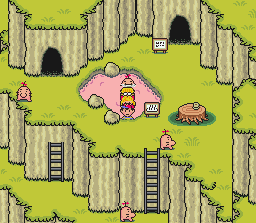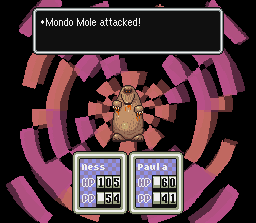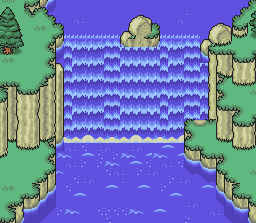There really isn’t another game like EarthBound.
Look, I know that’s a cliche. But here’s the thing: many developers, particularly on the indie scene, have tried to replicate what Itoi and co. accomplished with EarthBound for nearly thirty years. Sure, some of them have even been successful in their own right. Even Mother 3 is doing its own thing, incredible as it is. But, in some way or another, they all fall short of what makes this game so special.
So what is it that all these developers are missing? I think it’s quite simple: tone. Where others see quirk, Itoi sees feeling. Where others highlight complexity, Itoi highlights innocence. While others wallow in despair, Itoi finds hope. EarthBound sees this world with the clarity and the confusion of a young boy. Cult members in blue, the lonely kid next door, alien plots to destroy the world are all a bit “off.” But to a child, isn’t so much of the world strange and inexplicable? In fact, I was nine the first time I played this game and found large portions of it scary, but it didn’t seem any more strange than other RPGs. After all, I started playing it the same night I first watched Roswell. Itoi pulls off his razor-sharp satire because he filters it through this lens, and nothing since has been able to replicate it.
EarthBound establishes this tone at the outset. Ness wakes up in his bedroom to a loud crash outside. Still in his pajamas, he blearily wanders downstairs to his loving mother, who says that she just knows he has to check it out, but tells him to change out of his “jammies” first. On the way, you run into your next-door neighbor, Pokey, who, whether you want him to or not, accompanies you, despite his refusal to help you against the rats and crows you battle on your way up the hill. When you reach the top, you find a flaming meteor and Buzz Buzz the fly joins Ness’ party. He explains that he’s from the future and that it’s Ness’ destiny to destroy Giygas, an alien lifeform who has destroyed the future Buzz Buzz came from. After Pokey’s abusive parents kill Buzz Buzz, Ness leaves on his journey to gather powerful melodies from the eight Sanctuaries around the world to topple Giygas, and to gather friends along the way, of course.
Itoi clearly drew inspiration from Dragon Quest for this series, from the menus to the awkward inventory management. But if there’s one thing that is most like Dragon Quest to me, it’s the way the story unfolds. As you pursue the melodies worldwide, you land in different towns. Each town has unique problems, whether it’s a gang and the crooked cops who are following them, a cult of people who paint everything blue, or even a town that has a parallel “moon” version, they all have unique issues to address, and you’re there to help them. These little “short stories” are always a delight to uncover and help drive the relatively simple story along.

But really, it’s that tone, largely created by the characters, dialogue, and enemies you meet along the way, that makes the story so brilliant and effective in EarthBound. There’s an NPC around every corner with a bit of dialogue that tells you an enormous amount about them, their town, and their sense of humor in just a few words. The enemies, ranging from Hippies to Ohio road signs to, well, a giant pile of vomit, each bring their own charm. The best part, honestly, is all the adults who behave maliciously (or simply foolishly) who ultimately come around when faced with Ness and his group’s innocence and courage. Even the most evil characters flash signs of humanity which remind you they aren’t defined by their worst qualities. It’s this that infuses this game with its hope and optimism, and it’s what makes the justly famous and enormously moving ending land so well.
In some ways, all of that makes the relatively sparse direct characterization of the main characters stick out all the more. It’s really quite brilliant, though, because we learn everything we need to know to care about these characters from the people around them. Ness occasionally becomes homesick, and you have to call home to get rid of the ailment. His dad picks up every time you call and saves your progress, even encouraging you to “take a break” if you’ve been playing for too long. The children at Paula’s parents’ orphanage adore her. Jeff has the best friend anyone could ever ask for. Poo might be the weakest of the four, but the fact that we don’t know much about him is part of the point. They might not have much dialogue, but we come to care deeply about the four party members here and the people who love them, too.
The art style is certainly a part of establishing our love for this world, as well. While it is clearly an early SNES game, Itoi and the rest of his group understood something that developers still struggle with: style matters. The art is bright and colorful on the whole, evoking everything from Peanuts to South Park (which may be the closest art has come to replicating what EarthBound is doing). Certainly, things get dark and disgusting at times, but the innocent tone is maintained throughout largely because of the art. Oh, and I can’t leave without talking about the psychedelic backgrounds during battle. They rule.

Speaking of psychedelic, the music may be the most impressive thing EarthBound has to offer. Similar to the rest of the game, it manages to blend a remarkable range of styles, from jazz to brighter town themes, and filters them through a galactic synthesizer that makes the sound consistent. I know that doesn’t make sense, but it does, trust me. That’s just EarthBound. The game was a revelation in 1994 when most RPGs were trying to ape the sound of Final Fantasy and Dragon Quest, and it’s such a huge part of what makes the game hang together that I can’t imagine the game scored any other way.
If there’s one weak point in EarthBound, it’s with some of the gameplay. To be sure, the game is pulling a lot of what it does from Dragon Quest, but sometimes they decide to imitate the wrong things. For one, you spend entirely too much time in menus: managing inventory, interacting with the environment, even talking to NPCs. Everything happens there. I get it and the inspiration, but it’s not particularly fun.
Luckily, everything else about the gameplay, particularly the combat, works like a charm. First of all, EarthBound is the first turn-based RPG that I can personally remember where you could see enemies on the field. Even better, if you come up behind an enemy, you get the initiative, and if you are a much higher level, you’ll automatically win the battle. Battles themselves are a turn-based affair: they’re pretty standard in a lot of ways, with your normal DPS, healers, magic users, etc. But there are some fun twists tossed in. You can be affected by a variety of status ailments, such as catching a cold or being haunted by a ghost that will occasionally hit you for a couple of damage. The most unique thing is the rolling HP counter. When you take damage, your hit power slowly counts down. If you manage to heal up fast enough, you won’t die even when you take mortal damage. It’s not used as well here as it is in Mother 3, nor is the combat as satisfying, but it’s still effective, and its relative simplicity is appropriate to the tone of the game.

I would be remiss if I didn’t mention that I played the recent version added to Switch Online. Overall, it ran as smoothly as you’d expect, with some occasional slowdown with a lot of characters onscreen. Otherwise, it plays and looks and sounds like the EarthBound I remember. Save states are enormously helpful, though, for those long dungeons where you’re uncertain if you’re ready to take down the boss. If you’re afraid of playing an older RPG because of difficulty, the ability to save and load wherever you’d like should make it much more approachable.
EarthBound feels like what a children’s movie would look like if David Lynch made it. People always focus on the dark, weird, and aberrant aspects of Lynch’s work. But, much like EarthBound, there is a purity and heart to his best work (see Twin Peaks and Mulholland Drive) that keeps all the darkness from overwhelming the narrative, and we as viewers from being overwhelmed by his strange and surreal stories. Maybe what the million indie developers who want to make the next EarthBound should do is sit down and watch some David Lynch and pay attention to the humanity in the face of chaos. I’ll even volunteer to watch a few movies with them.



